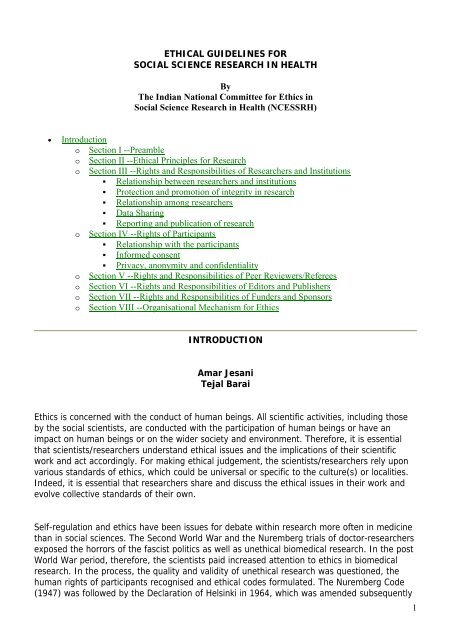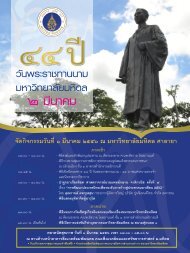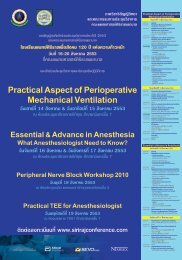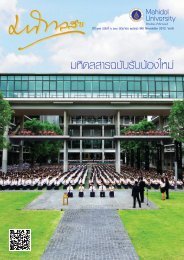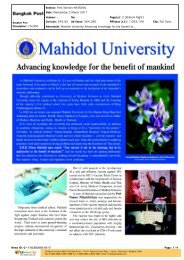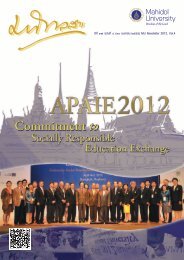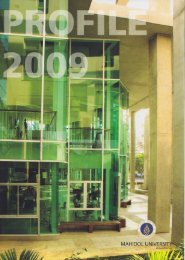ETHICAL GUIDELINES FOR - Mahidol University
ETHICAL GUIDELINES FOR - Mahidol University
ETHICAL GUIDELINES FOR - Mahidol University
Create successful ePaper yourself
Turn your PDF publications into a flip-book with our unique Google optimized e-Paper software.
<strong>ETHICAL</strong> <strong>GUIDELINES</strong> <strong>FOR</strong><br />
SOCIAL SCIENCE RESEARCH IN HEALTH<br />
By<br />
The Indian National Committee for Ethics in<br />
Social Science Research in Health (NCESSRH)<br />
• Introduction<br />
o Section I --Preamble<br />
o Section II --Ethical Principles for Research<br />
o Section III --Rights and Responsibilities of Researchers and Institutions<br />
• Relationship between researchers and institutions<br />
• Protection and promotion of integrity in research<br />
• Relationship among researchers<br />
• Data Sharing<br />
• Reporting and publication of research<br />
o Section IV --Rights of Participants<br />
• Relationship with the participants<br />
• Informed consent<br />
• Privacy, anonymity and confidentiality<br />
o Section V --Rights and Responsibilities of Peer Reviewers/Referees<br />
o Section VI --Rights and Responsibilities of Editors and Publishers<br />
o Section VII --Rights and Responsibilities of Funders and Sponsors<br />
o Section VIII --Organisational Mechanism for Ethics<br />
INTRODUCTION<br />
Amar Jesani<br />
Tejal Barai<br />
Ethics is concerned with the conduct of human beings. All scientific activities, including those<br />
by the social scientists, are conducted with the participation of human beings or have an<br />
impact on human beings or on the wider society and environment. Therefore, it is essential<br />
that scientists/researchers understand ethical issues and the implications of their scientific<br />
work and act accordingly. For making ethical judgement, the scientists/researchers rely upon<br />
various standards of ethics, which could be universal or specific to the culture(s) or localities.<br />
Indeed, it is essential that researchers share and discuss the ethical issues in their work and<br />
evolve collective standards of their own.<br />
Self-regulation and ethics have been issues for debate within research more often in medicine<br />
than in social sciences. The Second World War and the Nuremberg trials of doctor-researchers<br />
exposed the horrors of the fascist politics as well as unethical biomedical research. In the post<br />
World War period, therefore, the scientists paid increased attention to ethics in biomedical<br />
research. In the process, the quality and validity of unethical research was questioned, the<br />
human rights of participants recognised and ethical codes formulated. The Nuremberg Code<br />
(1947) was followed by the Declaration of Helsinki in 1964, which was amended subsequently<br />
1
(WMA, 1989). The Council for International Organisations of Medical Sciences (CIOMS) and<br />
the World Health Organisation (WHO) (1993) also proposed guidelines in 1983 and adopted<br />
them in 1992. These international developments followed as well as inspired several such<br />
initiatives at the national level and in various specific fields of biomedical research. India, too,<br />
did not remain unaffected. In 1980, the Indian Council of Medical Research formulated "Policy<br />
statement on ethical considerations involved in research on human subjects" and in 1997, it<br />
brought out the draft of "Consultative Document on Ethical Guidelines on Biomedical Research<br />
Involving Human Subjects".<br />
The issue of ethics in social sciences, unlike in medical research, has been given less<br />
prominence in India. Although many social scientists have paid serious attention to the<br />
appropriate conduct of research and set personal examples, they are often not discussed as<br />
ethics and no efforts are made to formalise some guidelines based on such experience(s). Our<br />
national councils for social science research and their institutions have many guidelines either<br />
as administrative orders or for improving the quality of research but enough efforts have not<br />
been made to bring them together as comprehensive ethical guidelines. Besides, in the<br />
absence of such comprehensive guidelines, ethics are hardly there in the social science<br />
education curriculum.<br />
But this situation in India is definitely not due to lack of attention to ethics in social sciences in<br />
other countries. In fact, In the post World War period, there has been growing pressure on<br />
social science professionals to self regulate and evolve their own codes of conduct. There has<br />
been a continuing debate between the view of making the social sciences "value free" and<br />
"objective" and the view that social scientists could not remain value free simply because they<br />
deal with contemporary society and because there is an explicit connection between research<br />
and social action or political viewpoint. The former tries to make social scientists attain a<br />
status of professionals and often puts them in ivory tower situations, while the latter tries to<br />
make them aware of the impact of their activities on the society. However, in both cases the<br />
ethics of the social inquiry and the application of the expertise of social science to current<br />
social problem need to be dealt with.<br />
Internationally, the associations of applied anthropology and the psychologists formulated<br />
their codes as early as in 1940s and 1950s. The controversy around the Project Camelot and<br />
its cancellation in 1965 led to increased discussion on ethics among the social scientists and<br />
eventually prompted most of the major social science associations to formulate their guidelines<br />
(Barnes 1979). The universities have also tried to establish formal guidelines to protect<br />
student research and their exploitation by the teachers. Our survey of ethical guidelines in the<br />
social sciences in different developed countries showed, to our surprise, that most associations<br />
of sociologists, anthropologists, political scientists, psychologists, etc. have formulated and<br />
refined their ethical guidelines in last three decades. Besides, in last one and half decades<br />
there have been attempts by the associations of different science and social science disciplines<br />
to combine their efforts and evolve joint guidelines. The most important effort made so far has<br />
been the joint efforts for evolving common ethical guidelines by medical, social science and<br />
natural science disciplines. For instance, the Medical Research Council of Canada, the Natural<br />
Sciences and Engineering Research Council of Canada and the Social Sciences and Humanities<br />
Research Council of Canada appointed a joint committee (called Tri-Council Working Group) to<br />
formulate "The Code of Ethical Conduct for Research Involving Humans". In 1997, these three<br />
2
councils adopted the Tri-Council report as a common code of ethics. Apparently some similar<br />
processes are also on the USA. In essence, these developments emphasise that the principles<br />
governing all research on humans by all disciplines of sciences have many things in common.<br />
And the researchers need to respect and protect human rights of the participants of research.<br />
The present effort to formulate ethical guidelines for research in social sciences and health in<br />
India began in 1998. After a rigorous documentation of the guidelines for medical as well as<br />
social science research in India and outside, a multi-disciplinary national committee was<br />
constituted in 1999. As is evident from their backgrounds (see Appendix for brief outline on<br />
each member of the committee), they brought together vast experience of last few decades in<br />
social science and health research and activism. The committee met twice to prepare the<br />
drafts of the guidelines and the final draft was mailed to over 100 researchers and institutions<br />
in different parts of the country to get their feed back. Besides, it was directly presented at six<br />
institutions to teachers, researchers and students. The feedback thus obtained from all over<br />
the country was summarised in a paper, which, along with the draft of the guidelines were<br />
then thoroughly discussed in a national meeting of researchers and activists from social<br />
science and health fields in May 2000. (See Appendix for the list of participants at the May<br />
2000 meeting.) The draft of the guidelines discussed at this meeting was again revised,<br />
discussed and adopted by the committee after the meeting. The final guidelines thus<br />
formulated are given in this document.<br />
In brief, we have made all possible efforts to consult the social scientists and health<br />
researchers from different parts of the country. Our objective was to incorporate available<br />
experience, expertise and concerns on ethics in the guidelines so that, they could be used by<br />
more and more researchers across the country in their work. We are aware that any effort<br />
(more so if it is voluntary effort) in formulating comprehensive guidelines for such a vast field<br />
of research in such a vast country like ours is not going to be adequate. However, the<br />
feedback received from the community of researchers suggests that this is a good beginning<br />
and we hope that as more researchers and institutions use these guidelines, they will get<br />
further refined and become more comprehensive. Perhaps it is true that real improvement in<br />
the standards of quality of and ethics in research in our country need more effort than the<br />
mere drafting of ethical guidelines. But at the same time the very process of drafting,<br />
discussing, adopting and ultimately using guidelines have not only an educational value, but<br />
they also contribute the larger process of improvement. The guidelines would also provide a<br />
means to individual researchers and institutions to resist pressures to undertake research that<br />
might compromise their ethics.<br />
The guidelines presented here provide an ethical framework based on four moral or normative<br />
principles and ten principles relevant for ethics in research in India. The ethics are after all<br />
arrived at on the basis of the context of the situation, and the principle-based framework<br />
assists the researchers in developing their moral arguments for choosing the most appropriate<br />
and ethical action in the given situation. In that sense, the guidelines are not administrative<br />
rules, but they are approximate standards informing the choice of action in a concrete<br />
situation. Fundamental to understanding and applying ethical principles and guidelines is the<br />
concern for and protection of the human rights of the participants. Further, the guidelines<br />
formulate rights and responsibilities of the four major actors in research endeavour; namely,<br />
the researchers, the institutions, the sponsors and funders, and the gatekeepers.<br />
Lastly, the development of organisational mechanism for ethics in social science research in<br />
3
health has been kept as an open process to be evolved by the community of researchers and<br />
institutions. The national meeting of researchers in May 2000 correctly felt that such a<br />
mechanism could be different for different types of institutions and projects; and that only by<br />
practising ethics within institutions could we arrive at appropriate models for the organisational<br />
mechanism. Indeed, such a process would also create a critical mass of individuals and<br />
institutions having experience in integrating ethics and guidelines in their institutional<br />
environment and the research process. Of course, this is a collective endeavour of networking,<br />
sharing, discussing and providing assistance to each other. We hope that the publication of<br />
this document will help in consolidating the process started while formulating it.<br />
REFERENCES<br />
Barnes J. A. (1979), "Who should know what? Social science, privacy and ethics", Cambridge:<br />
Cambridge <strong>University</strong> Press. Pages. 158-168).<br />
CIOMS (Council for International Organisations of Medical Sciences) and (WHO) World Health<br />
Organisation (1993), "International Ethical Guidelines for Biomedical Research Involving<br />
Human Subjects". Proposed Guidelines, 1983. Revised and adopted, 1992. Geneva:<br />
CIOMS/WHO.<br />
International Tribunal of Nuremberg (1947), "The Nuremberg Code". In Scholle Connor Suzan,<br />
Fuenzalida-Puelma Herman L. (Ed.), "Bioethics: Issues and Perspectives". See Appendices,<br />
Pages 217-8. Washington DC: Pan American Health Organisation.<br />
WMA (World Medical Assembly) (1989), "Declaration of Helsinki: Recommendations Guiding<br />
Physicians in Biomedical Research Involving Human Subjects". Adopted, June 1964 (Helsinki)<br />
and amended, October 1975 (Tokyo), October 1983 (Venice) and 1989 (Hong Kong. In Scholle<br />
Connor Suzan, Fuenzalida-Puelma Herman L. (Ed.), "Bioethics: Issues and Perspectives". See<br />
Appendices, Pages 218-20. Washington DC: Pan American Health Organisation.<br />
ICMR (Indian Council of Medical Research) (1980), "Policy Statement on Ethical Considerations<br />
Involved in Research on Human Subjects". New Delhi: ICMR.<br />
ICMR (Indian Council of Medical Research) (1997), "Consultative Document on Ethical<br />
Guidelines on Biomedical Research Involving Human Subjects". (Draft). New Delhi: ICMR.<br />
• Section I<br />
Preamble<br />
I.1. There has been a steady growth of research in the social sciences and in social science<br />
research in health in India. A wide range of research topics and issues including those that<br />
have the potential to seriously invade the privacy and security of individuals are being studied.<br />
Methodologies employed for such research have also expanded in range and depth. There is a<br />
considerable increase in the types and numbers of individuals and institutions undertaking<br />
such research and those sponsoring and funding it.<br />
I.2. While it is encouraging that social science research and social science research in health<br />
4
are getting the attention they deserve, the growth of research without social and ethical<br />
commitment could adversely affect the credibility of research, the autonomy of researchers,<br />
the quality of research and the rights of participants. In fact, there is a growing concern about<br />
indifference to ethics in some the social science research in the field of health in India.<br />
I.3. Social and ethical commitment and self-regulation are, therefore, imperative for all parties<br />
in research, namely, institutions undertaking research, researchers, funders/sponsors and<br />
those who publish material generated from research. Their individual and joint efforts are<br />
needed in order to achieve consensus on a common framework for research, and to improve<br />
and strengthen the system and environment in which research is conducted. Enunciation of<br />
ethical principles and formulation of necessary guidelines for research are, therefore, a part of<br />
such a process, and also a necessary and desirable step.<br />
I.4. This document contains ethical principles and guidelines formulated by a national<br />
committee with the additional inputs of individuals from different institutions and disciplines.<br />
While it has immediate specific applicability for social science research in health, it is relevant<br />
for social science research in other fields as well. For medical and clinical research some of the<br />
ethical guidelines may be different.<br />
I.5. The ethical principles and guidelines for social science research in health, given in this<br />
document, are developed for the follow purpose:<br />
(i) To sensitise and protect researchers who are often under pressures from various<br />
quarters/forces while undertaking research.<br />
(ii) To preserve and promote the autonomy of research through the observance of ethics,<br />
ethical values and ethical self-regulation.<br />
(iii) To protect and promote the human rights of participants and to sensitise and encourage<br />
researchers and organisations to respect participants' rights and needs.<br />
(iv) To improve quality, legitimacy and credibility of social science research in health.<br />
(v) To make ethics an integral part of the planning and methodology of research, and to<br />
enable organisations and individuals to develop appropriate mechanisms for ethical selfregulation.<br />
I.6. The ethical principles and the guidelines given in this document do not, by themselves,<br />
resolve all ethical problems and dilemmas, which may confront researchers. For each dilemma<br />
and conflict they face, researchers may be required to balance the demands made by moral<br />
principles of research. The resolution of the dilemma may best be arrived at in concrete<br />
relation to the context and circumstance(s); it may involve a decision privileging one principle<br />
over another.<br />
I.7. The experiences in using this document may be shared. Keeping in mind the immediate<br />
and long-term interests of the larger sections of people and the autonomy of researchers, the<br />
ethical guidelines given in this document may be refined through periodic reviews.<br />
5
Section II<br />
Ethical Principles for Research<br />
II.1. Four well-known moral principles constitute the basis for ethics in research. They are:<br />
(i) The Principle of Non-maleficence: Research must not cause harm to the participants in<br />
particular and to people in general.<br />
(ii) The Principle of Beneficence: Research should also make a positive contribution towards<br />
the welfare of people.<br />
(iii) The Principle of Autonomy: Research must respect and protect the rights and dignity of<br />
participants.<br />
(iv) The Principle of Justice: The benefits and risks of research should be fairly distributed<br />
among people.<br />
II.2. Ten general ethical principles, presently relevant for social science research in health in<br />
India, are as follows:<br />
(i) Essentiality: For undertaking research it is necessary to make all possible efforts to get and<br />
give adequate consideration to existing literature/knowledge and its relevance, and the<br />
alternatives available on the subject/issue under the study.<br />
(ii) Maximisation of public interest and of social justice: Research is a social activity, carried<br />
out for the benefit of society. It should be undertaken with the motive of maximisation of<br />
public interest and social justice.<br />
(iii) Knowledge, ability and commitment to do research: Sincere commitment to research in<br />
general and to the relevant subject in particular, and readiness to acquire adequate<br />
knowledge, ability and skill for undertaking particular research are essential prerequisites for<br />
good and ethical research.<br />
(iv) Respect and protection of autonomy, rights and dignity of participants: Research involving<br />
participation of individual(s) must not only respect, but also protect the autonomy, the rights<br />
and the dignity of participants. The participation of individual(s) must be voluntary and based<br />
on informed consent.<br />
(v) Privacy, anonymity and confidentiality: All information and records provided by participants<br />
or obtained directly or indirectly on/about the participants are confidential. For revealing or<br />
sharing any information that may identify participants, permission of the participants is<br />
essential.<br />
(vi) Precaution and risk minimisation: All research carries some risk to the participants and to<br />
society. Taking adequate precautions and minimising and mitigating risks is, therefore,<br />
essential.<br />
(vii) Non-exploitation: Research must not unnecessarily consume the time of participants or<br />
make them incur undue loss of resources and income. It should not expose them to risks due<br />
to participation in the research. The relationship within the research team, including student<br />
and junior members, should be based on the principle of non-exploitation. Contribution of<br />
each member of the research team should be properly acknowledged and recognised.<br />
6
(viii) Public domain: All persons and organisations connected to research should make<br />
adequate efforts to make public in appropriate manner and form, and at appropriate time,<br />
information on the research undertaken, and the relevant results and implications of<br />
completed research.<br />
(ix) Accountability and transparency: The conduct of research must be fair, honest and<br />
transparent. It is desirable that institutions and researchers are amenable to social and<br />
financial review of their research by an appropriate and responsible social body. They should<br />
also make appropriate arrangements for the preservation of research records for a reasonable<br />
period of time.<br />
(x) Totality of responsibility: The responsibility for due observance of all principles of ethics<br />
and guidelines devolves on all those directly or indirectly connected with the research. They<br />
include institution(s) where the research is conducted, researcher(s), sponsors/funders and<br />
those who publish material generated from research.<br />
Section III<br />
Rights and Responsibilities of Researchers and Institutions<br />
III.1. Relationship between researchers and institutions<br />
III.1.1. Institutions have a responsibility to respect the autonomy of researchers and the<br />
ethical guidelines for research.<br />
III.1.2. Institutions should create and maintain an environment with adequate support<br />
systems to enable researchers to follow ethical guidelines.<br />
III.1.3. Institutions have a responsibility to take appropriate and adequate steps for protection<br />
against pressures inimical to the observance of ethical guidelines for research.<br />
III.2. Protection and promotion of integrity in research<br />
III.2.1. Researchers have a right, as well as a responsibility, to refrain from undertaking or<br />
continue undertaking any research that contravenes ethical guidelines, violates the integrity of<br />
research and/or compromises their autonomy in research, including design methodology,<br />
analysis and interpretation of findings and publication. If they feel that their rights are being<br />
violated, or that the study is unethical, they should make all possible efforts at making<br />
corrections. In the event of failure of remedial measures they should exercise their right to<br />
terminate the study or to opt out of it.<br />
III.2.2. Researchers should undertake only such research that according to their<br />
understanding will be useful to society or for the furtherance of knowledge on the subject.<br />
III.2.3. Researchers should not undertake secret or classified research, any secret assignment<br />
under the garb of research nor research whose findings are to be kept confidential.<br />
Researchers have a right as well as responsibility to make all necessary efforts to bring the<br />
research and its findings to the public domain in an appropriate manner.<br />
III.2.4. Researchers have a responsibility towards the interests of those involved in or affected<br />
by their own work. They should make reasonable efforts to anticipate and to guard against<br />
possible misuse and undesirable or harmful consequences of research. Researchers should<br />
7
take reasonable corrective steps when they come across misuse or misrepresentation of their<br />
work.<br />
III.2.5. Researchers should ensure that there is honesty and transparency at every stage of<br />
research as these are indispensable for good and ethical research.<br />
III.2.6. Researchers should ensure that there is no fabrication, falsification, plagiarism or other<br />
unethical practices at any stage of the research; and that the findings of research are reported<br />
accurately and truthfully. They should also ensure protection of historical records and<br />
preservation of study material.<br />
III.2.7. All parties involved in research and dissemination of its findings should inculcate and<br />
practice sensitivity and respect for culture and other aspects of the group or community<br />
studied.<br />
III.2.8. Researchers must ensure respect, protection and promotion of rights of participants.<br />
Criteria for the selection of participants of research should be fair, besides being scientific.<br />
III.2.9. Peer review should be an essential part of every research endeavour or initiative, and<br />
should be sought at various stages of research.<br />
III.3. Relationship among researchers<br />
III.3.1. Principal researchers are responsible for the ethical conduct of research by all juniors,<br />
assistants, students and trainees. At the same time juniors, assistants, students and trainees<br />
have an equal responsibility for ethical conduct and observance of ethical guidelines.<br />
III.3.2. The juniors, assistants, students and trainees have a right to receive, and principal<br />
researchers have a responsibility to provide/impart, proper training and guidance regarding all<br />
aspects of research, including ethical conduct. The principal researchers should delegate to the<br />
juniors, assistants, students and trainees only those responsibilities that they are reasonably<br />
capable of performing on the basis of their education, training or experience, either<br />
independently or under supervision.<br />
III.3.3. No researcher should engage, personally or professionally, in discriminatory, harmful<br />
or exploitative practices, or any perceived form of harassment. Nor should the researcher<br />
impose views/beliefs on or try to seek personal, sexual or economic gain from anybody,<br />
including other researchers, juniors, assistants, trainees and students.<br />
III.3.4. Researchers should not deceive or coerce other researchers, including juniors,<br />
assistants, trainees and students into serving as research subjects/participants, nor use them<br />
as cheap labour.<br />
III.3.5. Researchers should be co-operative, responsive, honest and respectful about the<br />
interest, opinion/view, capability and work of other researchers, including juniors, assistants,<br />
trainees and students.<br />
III.3.6. While working in the team on a research project, at the outset, all members of the<br />
team have a right to know and document all aspects of research including ownership of the<br />
data. This procedure also applies to the participation of students doing their own research in a<br />
project team. Students should have the right to opt out of a research project without having to<br />
8
face adverse consequences.<br />
III.3.7. In addition to researchers, other individuals such as administrative staff of the<br />
organisation conducting research or that of the research setting, etc may be associated, in<br />
some way, with the research. All of them should be briefed on ethical issues and the<br />
guidelines, including the need to protect the rights of participants and the confidentiality of<br />
identifiable data.<br />
III.4. Data Sharing<br />
III.4.1. Sharing of data should be done in a form, which is in consonance with the interests<br />
and rights of the participants. Researchers who have conducted the study and the institution<br />
where the study is conducted are fully responsible for ensuring the protection and promotion<br />
of the interests and rights of participants while sharing or making public available data in any<br />
form.<br />
III.4.2. The researchers involved in a particular research and the institution where the<br />
research is conducted, have a joint right over and ownership of all raw data, including those<br />
identifying the participants. Along with this right, they are fully responsible for ensuring that<br />
when such data, including those that identify participants, are shared with other researchers,<br />
all necessary measures are taken and followed to maintain confidentiality, by those<br />
researchers with whom data are shared.<br />
III.4.3. Data that do not identify participants and their whereabouts, in the form of<br />
anonymous or abstracted facts, may be commonly shared, if necessary even before the<br />
publication of the study, among researchers, peer reviewers, or may even be made available<br />
to the public.<br />
III.4.4. As far as possible, researchers and institutions should ensure that relevant summary<br />
findings of the research are taken back to the research participants in a form and manner that<br />
they can understand. In this process they should take into consideration the possible social<br />
harm that such information might cause to the research participants.<br />
III.5. Reporting and publication of research<br />
III.5.1. Reporting of research and its results is the right as well as duty of every researcher<br />
and institution that conducted the study. When they agree to delegate this responsibility to<br />
funder(s)/sponsor(s) or any other individual(s)/organisation(s), they should do it only if they<br />
have received mutually agreed and expressed commitment to publish/disseminate the<br />
results/report within a stipulated period.<br />
III.5.2. The results should be reported irrespective of whether they support or contradict the<br />
expected outcome(s). Researchers should also disclose in their publications, the source(s) of<br />
funding and sponsors, if any, unless there is a compelling reason not to do so. The findings<br />
should also explain the methodology used, as well as how, in actual practice the ethical<br />
guidelines were followed, ethical dilemmas encountered and resolved, etc.<br />
III.5.3. Authorship credit: The following guidelines should be followed for giving authorship<br />
credit while reporting the research in any form:<br />
(i) Authorship, and its sequence in case of more than one author, should be based on the<br />
quantum of contribution made in terms of ideas, conceptualisation, actual performance of the<br />
9
esearch, analysis and writing of the report or any publication based on the research.<br />
Authorship and its sequence should not be based on the status of the individual in the<br />
institution or elsewhere.<br />
(ii) All other individuals not satisfying the criteria for authorship but whose contribution made<br />
the conduct and completion of research or publication possible should be properly<br />
acknowledged.<br />
(iii) A student should be listed as principal or first author on any multiple authored publication<br />
that substantially derives from the student's dissertation or thesis.<br />
(iv) Appropriate credits should be given where data or information from other studies or<br />
publications is quoted or otherwise included.<br />
III.5.4. Researchers should avoid dissemination of the results of research before they are<br />
peer-reviewed or published in appropriate journals. When such results are disseminated<br />
through the popular media, extra care should be taken to ensure that even those media<br />
persons not specifically trained in social science and health issues and research, are able to<br />
comprehend the limitations and implications of research results. Journalists and the media that<br />
publish these research results have a responsibility to do so truthfully and honestly.<br />
III.5.5. When institutions and/or researchers publish a report or any other documents based<br />
on research, they should make adequate efforts to ensure their easy availability and<br />
accessibility.<br />
Section IV<br />
Rights of Participants<br />
IV.1. Relationship with the participants<br />
IV.1.1. Participants should be seen as indispensable and worthy partners in research.<br />
Researchers should recognise and ensure that respect, protection and promotion of the rights<br />
of participants are made intrinsic to every stage and level of research undertaken by them.<br />
IV.1.2. Research undertaken should not adversely affect the physical, social and/or<br />
psychological well being of the participants. The risks and benefits of the research to the<br />
prospective participants must be fully considered; research that could lead to unnecessary<br />
physical harm or mental distress should not be undertaken. Researchers should make<br />
adequate provision for the comfort of the participants as well as for protection against all<br />
possible and potential risks.<br />
IV.1.3. The criteria for selecting research participants should be fair. The easy accessibility of<br />
the participants alone does not constitute a fair criterion for their inclusion in research as that<br />
will make them bear an unfair share of the direct burden of participation. At the same time, it<br />
should be borne in mind that no particular group or groups should be unfairly excluded from<br />
research, as that could well exclude them from the social understanding of their situation, and<br />
can also unfairly exclude them from direct, indirect or potential benefits of research.<br />
IV.1.4. Unless consent on mutually beneficial arrangement is obtained, institution and student<br />
should not use community or research setting as a constant and long-term resource for data<br />
10
collection for curricular research or training in an institution.<br />
IV.1.5. The relevant social, cultural and historical background of the participants should be<br />
taken into consideration and given appropriate importance in the planning and conduct of<br />
research.<br />
IV.1.6. Researchers should not impede the autonomy of participants by resorting to coercion,<br />
promise of unrealistic benefits or inducement. Participants and communities should not be<br />
exploited and the time taken for data collection from these sources should not be inordinately<br />
long.<br />
IV.1.7. Participants are autonomous agents and must have the right to choose whether or not<br />
to be part of the research. They also have the right to change their decision or withdraw the<br />
informed consent given earlier, at any stage of the research without assigning any reason.<br />
IV.2. Informed consent<br />
IV.2.1. Voluntary and informed participation of individuals or communities is necessary for<br />
research. Their participation should be based on informed consent; the greater the risk to<br />
participants, the greater is the need for it. Informed consent is essential to protect the<br />
participants, not the researchers and institutions.<br />
IV.2.2. Consent for participation in research is voluntary and informed only if it is given<br />
without any direct/indirect coercion and inducement, and is based on adequate briefing given<br />
to the participants about the details of the project. The briefing should be given both verbally<br />
and in writing in a manner and language that the participants know and understand. In the<br />
prevailing circumstances in India, often, it may not be possible to obtain signed informed<br />
consent of the participants in social science research in health. It is however essential that the<br />
participants are furnished with written information giving adequate details of the research.<br />
Researchers have a duty to ensure that the participants comprehend the information given.<br />
IV.2.3. The verbal and written briefing of the participants, in the manner and language they<br />
understand, should include the following details:<br />
(i) Purpose of research: The goal and objective of research should be presented in simple local<br />
language.<br />
(ii) Identity of the researchers: Name and address of researcher(s), the institution(s) and the<br />
main person of the ethics committee/ethical review board or any such ethics group of the<br />
institution.<br />
(iii) Identity of others associated with the research: Name(s) and address of chief<br />
consultant(s), funder(s) or sponsor(s), etc., if any.<br />
(iv) Why selected: Reasons or method for selecting the particular locality, community and/or<br />
any other setting; and individual(s) or group(s) within that, for participation in the study.<br />
(v) Harms and benefits: The possible, anticipated and potential benefits and/or harms<br />
(direct/indirect, immediate/long term) of research and their participation.<br />
(vi) Privacy, anonymity and confidentiality: Information on the extent of privacy, anonymity<br />
11
and confidentiality that will be provided to participant(s). This must include, at least, the firm<br />
commitment that privacy, anonymity and confidentiality of data identifying participants will be<br />
strictly maintained. In case the data identifying participants is to be shared with or made<br />
available to individuals/organisations not in the research team, information about them (their<br />
names, addresses etc.) should be provided.<br />
(vii) Future use of information: The future possible use of the information and data obtained,<br />
including use as a database, archival research or recordings for educational purposes, as well<br />
as possible use in unanticipated circumstances, like its use as secondary data should be made<br />
known to participants. Such use should be only of anonymous or abstracted information and<br />
data, and should in no way conflict with or violate the maintenance of privacy, anonymity and<br />
confidentiality of information identifying participants.<br />
(viii) Right not to participate and withdraw: Participants should also be informed about their<br />
right to decline participation outright, or to withdraw consent given at any stage of the<br />
research, without undesirable consequences, penalty and so on. The participants should be<br />
informed that they are free to object to and refuse to allow the use of data gathering devices,<br />
such as camera, tape recorder, etc.<br />
(ix) Right to get help: The researcher should try and get all the possible help that the<br />
participants might require. The researcher also has a responsibility to help the participant(s) in<br />
cases of adverse consequence or retaliation against the participant(s) by any agency due to<br />
their participation in the research. Information, which may contribute to the improvement of<br />
quality of life of the participants, should be passed on to concerned person(s), official(s) or the<br />
agencies.<br />
IV.2.4. If the data collection from the participant(s) is done in more than one sitting or contact<br />
and there is a long time period between the sittings/contacts, informed consent should be<br />
sought each time.<br />
IV.2.5. In some cases, revealing the identity of the group of participants, groups, village(s),<br />
neighbourhood(s), etc, in the report could have an adverse effect on members/residents<br />
there. Sometimes the researchers are not able to anticipate the possibility of adverse effect at<br />
the time of conducting research and publishing reports. Researchers should take care that the<br />
study communities and/or localities are not identified or made identifiable in the report unless<br />
there are strong reasons for doing so. If the researcher(s) and institution intend to identify<br />
them in the report, participants' informed consent allowing such disclosure should be obtained.<br />
IV.2.6. Non-disclosure of all information: In some specific situations and research issues, it is<br />
not practically possible to carry out research if all the details of the study are revealed to<br />
participants. This may be due to genuine difficulties in accessing participants, possibility of<br />
affecting change in behaviour or responses, etc., when the details are revealed. Thus, it is not<br />
possible to obtain the informed consent in the same way as described above. In such cases,<br />
the following should be done:<br />
(i) A detailed justification for not revealing all necessary information must be provided in the<br />
research proposal and methodology and should be subject to peer and ethical reviews. Only<br />
on approval in peer review, should such research be undertaken.<br />
(ii) The participants' right to privacy, anonymity and confidentiality gains additional importance<br />
12
in such cases as they do not know fully the real purpose or objective for which they provide<br />
information.<br />
(iii) Even if through a peer review process it is accepted that some of the information about<br />
the study need not be revealed, participants must be provided the rest of the information.<br />
Under no circumstance should the researchers withhold the information regarding physical<br />
risks, discomfort, unpleasant emotional experiences, or any such aspect that would be a major<br />
factor in taking the decision to participate.<br />
(iv) As far as possible, debriefing should be done with the participants after completion of the<br />
research, giving reasons for not providing full information. As a part of the debriefing process,<br />
it might often be necessary to provide services such as counselling and referral.<br />
IV.2.7. Consent where gatekeepers are involved: In some situations there may be a need to<br />
obtain permission of the 'gatekeeper' to access the participants for research. The following<br />
care must be taken in such situation:<br />
(i) Permission obtained from the gatekeeper must not be substituted for the need to take<br />
separate and full informed consent of the participants. The rights of participants in such<br />
situation are the same as in all other cases and need determined protection.<br />
(ii) For obtaining permission of the gatekeeper, no pre-condition demanding sharing of<br />
information or data obtained should be accepted.<br />
(iii) In the process of research or data collection, adequate care should be taken to ensure<br />
that the relationship between the gatekeeper and the participants is not jeopardised.<br />
(iv) Greater care should also be exercised in protecting participants and their interest while<br />
publishing and disseminating results of research.<br />
IV.2.8. Informed consent in the case of research with children (below the age of fourteen<br />
years) should be sought from the parents/guardians as well as the children themselves. Where<br />
the parents/guardians consent to participate, and the children have declined, the rights of the<br />
children should be respected. The consent from parents/guardians should be waived only in<br />
special cases such as child abuse. Peer review is indispensable and the protection of children<br />
especially from the immediate consequences of research gains prime importance.<br />
IV.3. Privacy, anonymity and confidentiality<br />
IV.3.1. Anonymity and confidentiality are the inherent of all participants. The right whether to<br />
remain anonymous or to be identified lies with the participant. It becomes all the more<br />
important in research projects dealing with stigmatised, sensitive or personal issues and<br />
information.<br />
IV.3.2. Possibility of the breach of confidentiality and anonymity should be anticipated,<br />
addressed and explained to the participants.<br />
IV.3.3. Appropriate methods should be devised to ensure privacy at the time of data collection.<br />
These methods are also essential to ensure the validity of data.<br />
IV.3.4. The obligation to maintain privacy, anonymity and confidentiality extends to the entire<br />
13
esearch team, other researchers in the institution, the administrative staff, and all those (from<br />
or outside the institution) not directly associated with the research who may possibly have<br />
access to the information.<br />
IV.3.5. While deciding on what information should be regarded as private or confidential, the<br />
perspective of the participant(s) on the matter should also be given adequate importance.<br />
IV.3.6. Researchers should maintain appropriate anonymity and confidentiality of information<br />
in creating, storing, accessing, transferring and disposing of records under their control,<br />
whether these are written, automated or in any other medium.<br />
Section V<br />
Rights and Responsibilities of Peer Reviewers/Referees<br />
V.1. The purpose of peer review and refereeing is to improve and advance research, and<br />
facilitate observance of ethics. Researchers should be encouraged to make themselves<br />
available for such work and subject their own work to such a process.<br />
V.2. Researchers should accept the role and duties of peer reviewer and referee only for the<br />
research in the fields they have adequate knowledge and expertise. They must also be fully<br />
aware of the ethical aspects of research and publication.<br />
V.3. When called upon to act as peer reviewer and referee, researchers have an ethical duty to<br />
undertake it objectively, impartially and constructively.<br />
V.4. If the peer reviewers/referees have any actual or potential conflicts of personal or<br />
professional interest with the work under review, they should either disclose the same or<br />
decline to review the work concerned. In such situations, their role should be decided on the<br />
basis of the type and severity of the conflict of interest.<br />
V.5. When malpractice in research or violation of ethics are discovered, the researcher/peer<br />
reviewer has the ethical responsibility to take appropriate steps to report it.<br />
Section VI<br />
Rights and Responsibilities of Editors and Publishers<br />
VI.1. Before accepting the research based articles for publication, editors and publishers have<br />
the right and duty to ensure that such material is, duly reviewed by referees deemed by the<br />
publication to have the relevant expertise and knowledge in the particular field.<br />
VI.2. As social scientists and as journalists, editors are responsible for ensuring that the<br />
editorial policy and instructions to authors reflect the ethical concerns and the guidelines for<br />
research. Referees and editorial staff should be made aware of the editorial policy including<br />
the need for articles/papers to adhere to prescribed ethical norms. Contributors should be<br />
informed that the material submitted for publication should carry appropriate credits.<br />
Fabricated, falsified or plagiarised information should not be entertained.<br />
14
VI.3. If, after the publication of material, any doubt is raised about its ethical status or ethical<br />
conduct of the study on which the said material is based, editors should take appropriate<br />
corrective steps.<br />
Section VII<br />
Rights and Responsibilities of Funders and Sponsors<br />
VII.1. Funders and sponsors have the right to expect that researchers and institutions report<br />
the progress of their work and submit a copy of the final report on results of research as per<br />
the schedule agreed in advance.<br />
VII.2. Funders and sponsors have a right to get a copy, if any, of the ethical guidelines for<br />
research followed by the researchers and institutions. They also have a right to expect that the<br />
research proposal submitted for funding or sponsorship by researchers and institution contains<br />
necessary information on ethical issues in and ethical conduct of the particular research<br />
proposed.<br />
VII.3. The funders and sponsors of research should respect the ethical guidelines for research<br />
and should not expect researchers and institutions to undertake research or conduct it in any<br />
way contrary to the ethical guidelines.<br />
VII.4. Where sponsors and funders also act, directly or indirectly, as gatekeepers and control<br />
access to the participants, researchers should not devolve onto the gatekeeper their<br />
responsibility to obtain separate and full informed consent from participants and protect all<br />
rights of the participants.<br />
Section VIII<br />
Organisational Mechanism for Ethics<br />
While ethical guidelines are not administrative rules and the conscience of researchers may be<br />
the best guide for ensuring that ethics are followed in research and for resolving ethical<br />
dilemmas, conduct of research cannot be completely left to the discretion of individual<br />
researchers. Institutions and researchers involved in social science research in health should<br />
create appropriate institutional or research project based mechanisms to ensure ethical<br />
conduct of research and implementation of guidelines.<br />
15


